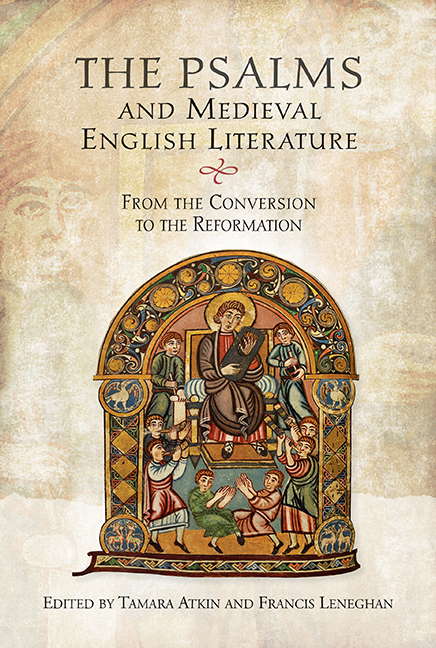Book contents
- Frontmatter
- Contents
- Figures
- Contributors
- Preface
- Acknowledgements
- Abbreviations
- Miscellaneous Frontmatter
- Introduction A Case Study of Psalm 50.13 in Old and Middle English
- I Translation
- II Adaptation
- 6 Making the Psalter Sing: the Old English Metrical Psalms, Rhythm and Ruminatio
- 7 The Psalms in the Old English Office of Prime
- 8 Psalm Genres in Old English Poetry
- 9 Articulating the Psalms in Middle English Alliterative Poetry: Some Passages of Piers Plowman, St Erkenwald and Pearl
- III Voice
- Index
8 - Psalm Genres in Old English Poetry
from II - Adaptation
Published online by Cambridge University Press: 09 May 2017
- Frontmatter
- Contents
- Figures
- Contributors
- Preface
- Acknowledgements
- Abbreviations
- Miscellaneous Frontmatter
- Introduction A Case Study of Psalm 50.13 in Old and Middle English
- I Translation
- II Adaptation
- 6 Making the Psalter Sing: the Old English Metrical Psalms, Rhythm and Ruminatio
- 7 The Psalms in the Old English Office of Prime
- 8 Psalm Genres in Old English Poetry
- 9 Articulating the Psalms in Middle English Alliterative Poetry: Some Passages of Piers Plowman, St Erkenwald and Pearl
- III Voice
- Index
Summary
For the last five hundred years, perhaps longer in some respects, the Bible has been a single tome, large in scope if not also in size, encompassing all the works established by the Christian church as ordered or impelled by God for the enlightenment and edification of humanity. The Old Testament, the first thirty-nine books, offers a prefiguration of the New Testament in twentyseven books, particularly the four gospels in which the prophecy of the Jewish books is brought to fruition in the Christian narrative of salvation. The sixtysix books of the Bible together have the wisdom and spiritual guidance needed for the individual Christian to reach salvation, always presented in the same order and in words whose pattern and ideas are without a doubt divinely inspired. In the modern Bible the Book of Psalms falls after the historical books of the chronicles and the early prophets, at the beginning of the four books of wisdom. After it appear Proverbs, Ecclesiastes and the Song of Songs, then the sequences of major and minor prophets. Thus, the Psalms have their specific and structured place in modern editions.
In the medieval Bible, particularly the early medieval Bible, matters were very different. The place of the Psalms in particular is hard for the modern individual to fathom. The Psalter was most commonly a separate manuscript, and one that accreted to itself a broad range of additional material for private prayer and for participating in the daily offices. On occasion, the Psalter was even the first text and centrepiece for breviaries and manuals offering all the liturgical material necessary for a priest or a bishop, texts for mass and office, including lections and later additions such as the offices for the Virgin or the dead. The Psalter remained at the core of these manuscripts, the one text necessary for all devout Christians to know. It offered a prayer book, a set of hymns of praise and lament, a way to learn the basic alphabet and Latin and a mode of exemplary Christian behaviour.
Having a book of the Bible known so thoroughly, so deeply in the bones and the soul of the individual, is difficult for us to comprehend today.
- Type
- Chapter
- Information
- The Psalms and Medieval English LiteratureFrom the Conversion to the Reformation, pp. 218 - 232Publisher: Boydell & BrewerPrint publication year: 2017

